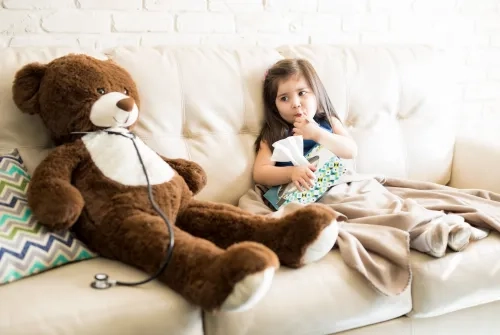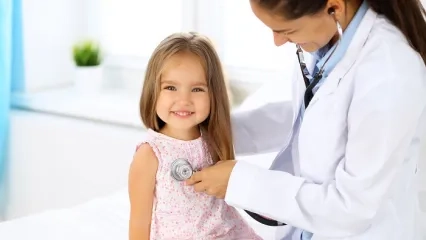Alo Yeditepe
Alo Yeditepe
If Your Child is Constantly Getting Sick in the Winter, It Could be Due to Allergies
In winter, in children with frequent colds and flu, runny nose, congestion, itching; cough that does not go away at night, wheezing due to cough or shortness of breath, the underlying cause may be ‘allergy’. Yeditepe University Kozyatağı Hospital Pediatric Immunology and Allergy Specialist Prof. Dr. Hülya Ercan Sarıçoban points out that infections in allergic children last longer than in other children. Sometimes, infections themselves can trigger allergic diseases.
Allergies that are common in the spring months, spending more time indoors in winter, especially exposure to indoor allergens such as house dust, are increasing. Prof. Dr. Hülya Ercan Sarıçoban points out that wheezing due to a runny nose, cough, and cough, which last longer than 3 weeks, may be of allergic origin. In addition, food allergies, which are more common in infants under one year of age, are manifested by nasal congestion, runny nose, cough, and wheezing complaints, just like pollen or house dust mites. These babies are more prone to viral infections in the winter. Their infections can progress to bronchiolitis. Diseases like asthma and allergic rhinitis, if confused with infectious diseases, can lead to unnecessary antibiotic use and delayed treatment of the actual disease.
Beware of these symptoms!
Since different organs and systems are affected to different degrees in an allergic reaction, the symptoms of allergic diseases can occur in many different ways.
If the respiratory system is affected:
- Prolonged and increasing cough at night,
- Wheezing from the chest,
- Shortness of breath,
- Runny nose and congestion,
- Sneeze,
- Recurrent middle ear and sinusitis problems may occur.
If the circulatory system is affected:
- Suddenly developing pallor on the face,
- Blood pressure drop and palpitations may occur.
In some cases, depending on how multiple systems are affected, most or even all of these symptoms can be seen at once. When these symptoms are seen in the child, it is necessary to consult a specialist physician. Allergy can be diagnosed with various blood and skin tests to be performed by the physician.
Since allergy is a chronic disease, preventive treatment given in the absence of complaints is as important as its treatment in the acute period. The basis of treatment is the elimination of the factor or factors that cause allergies. Medication can also be used to relieve symptoms.
Miracle to prevent allergic diseases: Breast milk!
Underlining that breast milk is very important for the development of allergic diseases in children, Prof. Dr. Hülya Ercan Sarıçoban says that babies should definitely take breast milk in the first 6 months and recommends that it be continued until the age of 2 if possible. The child's immune system can only fully develop around the age of five. Childhood vaccinations made during this period have an important place in protecting from diseases.
Being allergic does not prevent you from going to school, playing sports, or engaging in daily activities!
Emphasizing that children with allergic diseases under control are no different from other children, Prof. Dr. Hülya Ercan Sarıçoban continues her words as follows:
“It is necessary to know what the allergy is against, to take precautions before the allergy time comes, and to use allergy-protective drugs if necessary. It is important to prevent unnecessary antibiotic use and to eat vegetables and fruits instead of fast food. If possible, children should not be introduced to environments such as nurseries and shopping malls where they can encounter allergens and infections more easily. Vitamins, herbal remedies used cannot protect the child with weak immunity. Washing your hands often is also very important.”
About
Faculty and Year of Graduation:
Hacettepe University Faculty of Medicine, 2000
”
See Also
- Is Swallowing Cat Hair Dangerous?
- What is Predisposition to Allergy (Atopy)?
- Allergies in Children Can Increase During the Summer Months
- How to Choose Baby Clothes?
- Vaccine Rejection Can Lead to Irreversible Problems!
- Children Whose Parents Are Allergic Are More At Risk
- Pay Attention to the Children Who Get Sick Often
- Allergic Disease Rates Increased from 3% to 15% in the Last 20 Years
- High Fever in Children Article Series I
- Genetics is the Key Cause of Food Allergies in Children
- Pay Attention to Food Allergies in Children!
- Points to Be Considered in Baby Clothing
- What and How Much Should Children Eat at Which Time of Meal?
- What is the Right Lunch Box for Children?
- Infection Can Cause the Onset of Asthma Disease
Alo Yeditepe











